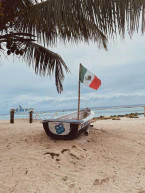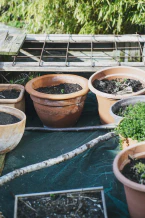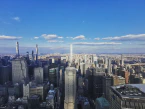Redefining Our Future: Challenging Economic Dogmas

The Collapse of Civilizations: Environmental Factors and Climate Change
As I reflect upon my memories, I am reminded of a pivotal moment that shook the very foundation of my beliefs. It was the year 2007, and the world was facing an unprecedented crisis – the subprime crisis and the collapse of major American banks. This event acted as an electric shock, jolting me out of my comfortable existence in the world of finance.
For years, I had been immersed in the intricacies of finance, knowing everything about it, or so I thought. The topics of ecology, the potential end of the world, and other related matters were merely dismissed by me as unfounded concerns. However, the crisis of 2007 shattered my illusions and made me realize the extent of my misconceptions.
In the aftermath of the crisis, I came to a sobering realization that we were headed towards disaster. My entire worldview crumbled within a few months, and I found myself questioning everything I had once believed in. This revelation led me to recognize the tremendous opportunity hidden within this seemingly dire situation – the chance to change the world.
But before we can embark on this transformative journey, we must first grieve and let go of the world we live in today. To aid me in this process, I turned to the works of Jared Diamond, particularly his book “Collapse.” Diamond had identified five factors that contributed to the downfall of civilizations throughout history, such as the Mayas, Vikings, and the great Mesopotamian civilizations. Astonishingly, these very same factors are reemerging today, posing a threat not only to a single civilization but to the entire global village we call humanity.
The first factor is the environmental aspect. Over the past two centuries, and especially in the last 50 years, we have inflicted severe and often irreversible damage to our environment. The second factor is climate change, which has historically weakened ecosystems, leading to resource scarcity, and destabilizing societies on economic, geopolitical, and social fronts.
The third factor, still prevalent today, is the resurgence of military conflicts. When ecosystems become unstable and resources grow scarce, conflicts and wars tend to arise. It is crucial to remember that even now, France finds itself engaged in a war in Mali.
The fourth factor, equally significant, is the cancellation of diplomatic and commercial alliances. Our current state of uncertainty regarding the future of Europe shows the undermining of alliances established in the past.
Lastly, the fifth factor, which should not be overlooked, is the blindness of our elites. In times of civilization collapse, these elites fail to recognize the impending downfall of their world and are unable to adapt their perspectives. This results in the exacerbation and acceleration of the collapse.
Understanding the gravity of these factors, we must acknowledge that the end of a world is not the same as the end of the world itself. Instead, we find ourselves in a transitional period, poised between two worlds. The world of today, which we must turn the page on, and the world of tomorrow – a sustainable world that is slowly taking shape, albeit without precise definition.
In this historical moment, reminiscent of the Renaissance, we are compelled to reinvent ourselves and our values. Just as the Renaissance brought about a new understanding of the world, we too have the opportunity to reshape our perception.
Creativity is another hallmark of the Renaissance, and in recent years, we have witnessed an explosion of innovation and ingenuity. From 3D printing to countless technological advancements, creativity is thriving.
Contrary to popular belief, the Renaissance was not without its share of violence. Similarly, we find ourselves grappling with violence on a daily basis, from religious and civil wars to the tragic loss of innocent lives due to gun violence in schools.
The Renaissance was also marked by a transformative invention: the printing press, pioneered by Gutenberg. This invention transformed knowledge distribution in Europe and eventually worldwide. Today, we have a new tool in our hands – the internet – which grants us instantaneous access to information, placing the knowledge of the world at our fingertips.
In the face of crumbling certainties, we must confront the question of whether we are repeating the mistakes of our ancestors. Are our current beliefs and certainties destined to fall apart in the coming years? What are the cherished values that may crumble within the next few decades?
As an economist, I recognize at least three economic certainties that may be called into question. Firstly, the notion that economic growth is the sole driving force of our society. Secondly, the fallacy of infinite growth in a finite world. And thirdly, the sacrifice of the living for the sake of this growth.
The time has come for us to challenge these dogmas. We have bestowed upon ourselves the right to pollute, poison, and harm, all in the name of growth. But is it justifiable? Can we continue to sacrifice the well-being of our planet and future generations for economic gain?
To initiate change, we must organize a new controversy, a global debate. This controversy will revolve around defining the limits of human activity in relation to nature. How much can nature endure? What economic model can coexist harmoniously with our environment? Should we continue to authorize the degradation of our planet and the destruction of our common heritage?
This new controversy will pave the way for the Universal Declaration on the Duties of Man towards Nature – a parallel to the Universal Declaration of Human Rights that shaped our modern world. Just as the latter established the foundation for our present, the former will set the boundaries of our future.
Launching this controversy is both simple and profound, thanks to the unprecedented tool of connection that we possess. Our interconnectedness will transform the way we approach this global debate, allowing people from all corners of the world to participate and contribute.
As I conclude this discourse, I invite you all to join me in initiating the first tweet about this new controversy. Let us continue the conversation, debate, and exchange of ideas beyond my words. Together, we can shape a future that respects nature, redefines our values, and transforms our world from within. Thank you.
The Rebirth of a New Renaissance: Understanding, Creativity, and Knowledge Distribution
In the depths of my recollections, a significant period emerges—one that has the potential to shape our future just as it transformed our past. This period, often referred to as the Renaissance, was marked by a profound shift in our understanding of the world. As I reflect on the events of the 15th century, I am reminded of the bold explorations of Christopher Columbus, who discovered the Americas and revealed the vastness of our planet. This newfound understanding expanded our horizons and challenged our preconceived notions.
Today, we stand at the brink of another transformative era—a rebirth of the Renaissance, if you will. This resurgence is fueled by unparalleled creativity that permeates our society. We need not look far to witness the remarkable inventions and innovations that have emerged in recent years. From the advent of 3D printing to countless other breakthroughs, creativity is flourishing in our modern world.
Contrary to popular belief, the Renaissance was not a period devoid of conflict. It was marked by violence, religious wars, and the extermination of indigenous communities, just as our present reality is marred by daily acts of violence and tragic incidents like school shootings.
Yet, there is another facet of the Renaissance that holds tremendous promise—the democratization of knowledge. Johannes Gutenberg, with his revolutionary printing press, forever changed the distribution of knowledge in Europe and beyond. Today, we possess a tool far mightier than Gutenberg’s press—the internet. It has placed a wealth of information at our fingertips, allowing instantaneous access to the collective wisdom of humanity.
As we navigate this juncture in history, we are confronted with a pressing question: Are we experiencing a new Renaissance? Can we harness the power of understanding, creativity, and knowledge distribution to shape a better future?
This question carries profound implications. It challenges us to reevaluate our assumptions, explore new frontiers of thought, and hug a paradigm shift. Our capacity to adapt and innovate will be crucial as we strive to navigate the complexities of the 21st century.
The world of tomorrow, the sustainable world that we yearn for, is gradually taking shape. However, its precise contours are yet to be defined. We find ourselves in a historical period that demands nothing short of reinvention—an opportunity to rewrite the narrative and redefine our values.
In this journey towards a new Renaissance, we must remember that change begins within ourselves. Each one of us has the power to contribute to the grand tapestry of transformation. As we engage in dialogue, exchange ideas, and challenge long-held beliefs, we become the catalysts for progress.
Let us hug the spirit of the Renaissance, where knowledge and creativity reign supreme. Together, we can forge a path towards a future that encompasses both our collective wisdom and the preservation of our planet. The possibilities are vast, and the potential for positive change is within our grasp.
As we embark on this collective endeavor, let us remember the words of Michel Serres, who emphasized the importance of reconciling with nature and including it in our endeavors. It is not about idolizing nature but rather acknowledging our interconnectedness and acting responsibly.
So, as we tread the path of the new Renaissance, let us care our understanding, release our creativity, and utilize the vast resources at our disposal to shape a world that thrives on harmony, innovation, and sustainability. Together, we can bring about a renaissance that surpasses the achievements of the past and paves the way for a brighter tomorrow.
Challenging Dogmas: Growth, Exploitation, and Sacrifice
As I reflect on the speaker’s memories, I am struck by their profound insights into the prevailing dogmas that have shaped our economic model. It is time to question these long-standing beliefs and examine the consequences of our actions.
The first dogma that demands scrutiny is the notion that economic growth is the sole motor driving our society. For far too long, we have equated growth with progress, assuming that it is the ultimate measure of success. However, we must pause and reflect on the true meaning of “economy.” In Greek, it signifies resource management, domain, and household management. Growth is not synonymous with economy; it is merely a component of it.
Another dogma that deserves our attention is the fallacy of infinite growth. Our current consumption model operates on the assumption that growth can continue indefinitely, despite the undeniable reality that our planet’s resources are finite. As our population continues to expand, the strain on these resources intensifies. It is imperative that we confront this contradiction and seek alternatives to our unsustainable practices.
The third dogma, closely tied to the previous one, is the sacrificial mindset that necessitates the exploitation and degradation of our environment. Under the guise of economic growth, we have granted ourselves the right to pollute, poison, and harm. But should progress come at the expense of the well-being of our planet and future generations?
These dogmas have permeated our society and dictated our actions for far too long. However, it is crucial that we challenge them and foster a new dialogue. The speaker raises an essential question: Can we continue to authorize this behavior? Are we prepared to accept the consequences of our relentless pursuit of growth and exploitation?
These questions prompt us to reevaluate our values and envision a future that transcends the confines of these dogmas. We must foster an open-minded approach that hugs the possibility of change. The answers may not be readily apparent, but by engaging in collective introspection and discourse, we can pave the way for a more sustainable and harmonious world.
It is worth considering the historical context. Centuries ago, those who dared to question prevailing beliefs faced persecution and condemnation. However, their insights and courage eventually led to profound transformations in human history. Today, we have the opportunity to follow in their footsteps, challenging the dogmas that hinder our progress and well-being.
To embark on this journey, we need to organize a new controversy—an inclusive and global debate. This controversy will enable us to establish the limits of human activity in relation to nature, determining what nature can endure and what kind of economic model is compatible with its preservation.
Such a controversy may seem daunting, but we are fortunate to possess a powerful tool that can facilitate this discourse—the power of connection. The internet has connected us all, transcending geographical boundaries and enabling us to engage in conversations that shape our collective future. It is through this connectivity that we can foster the necessary dialogue and chart a path towards a sustainable world.
In conclusion, it is incumbent upon us to challenge the dogmas of growth, exploitation, and sacrifice. We must question the status quo and envision a new paradigm that prioritizes the well-being of our planet and future generations. By engaging in a new controversy, hugging open-mindedness, and utilizing the power of connection, we can pave the way for a future that transcends the limitations imposed by these outdated dogmas. Together, let us forge a path towards a more sustainable, equitable, and prosperous world.
Organizing a New Controversy: Defining the Limits of Human Activity towards Nature
Within the speaker’s recollections, a call to action emerges—an imperative to organize a new controversy that delves into the boundaries of our relationship with nature. It is a pivotal moment that demands our attention and collective participation.
But what does it mean to organize a controversy? It entails initiating a global debate—a spirited discussion that traverses borders and engages minds from all walks of life. This debate centers on determining the tolerance limits towards nature in the face of human activity. How far can we push the boundaries? What kind of economic model can coexist harmoniously with nature? These are the questions that must guide our discourse.
Nature holds an intrinsic value that extends beyond its utilitarian purposes. It is not merely a bottomless pit or a resource mine that we can exploit without consequences. It is a living world that we are intricately connected to, and we must recognize and include it in our endeavors. By doing so, we can strike a balance that respects nature while fostering human progress.
Launching this new controversy is no small task, but it is an endeavor that can redefine our future. History has shown that seemingly insurmountable challenges can be overcome through collective effort. Just as important movements have emerged from the depths of societal debates, we can utilize our interconnectedness to initiate this global dialogue.
Now, you might be wondering how we can rally the masses and kickstart this controversy. Well, the answer lies in the remarkable tool that has transformed our world—the internet. Through the power of connectivity, we can bring people together, regardless of their physical location, to engage in meaningful conversations about our relationship with nature.
Imagine the possibilities that lie before us. We can transcend borders, cultures, and perspectives to collectively shape a new narrative—one that safeguards the planet while promoting sustainable development. The internet has granted us the ability to share ideas, exchange knowledge, and foster collaboration on an unprecedented scale. It is through this connectivity that we can fuel the flames of this new controversy and ignite change.
But why is this controversy so crucial? It is because we find ourselves at a crossroads, teetering on the precipice of an uncertain future. The consequences of our actions today will reverberate for generations to come. By engaging in a global debate, we can collectively establish the Universal Declaration on the Duties of Man towards Nature—an essential counterpart to the Universal Declaration of Human Rights that has shaped our modern world.
This declaration will serve as a compass, delineating the limits of human activity and providing a framework for responsible behavior. It is not about idolizing nature or placing it on an altar, but rather about striking a harmonious balance between human progress and environmental preservation.
In this journey, it is essential to acknowledge that change begins within ourselves. Each one of us has the power to contribute to this controversy and shape a more sustainable future. By fostering an open mind, hugging diverse perspectives, and caring a sense of empathy, we can collectively redefine our relationship with nature.
So, I invite you to be a part of this transformative movement. Let us use the internet as a catalyst for change, connecting with others, and sharing our thoughts and ideas. Together, we can organize a controversy that sparks the necessary discussions, challenges ingrained beliefs, and shapes a future where humanity and nature coexist in harmony.
The time for action is now. Let us embark on this journey of discovery, exploration, and transformation. By participating in this global debate, we can redefine our role in the world, ensuring a sustainable and thriving future for generations to come. Together, let us forge a path towards a new understanding of our responsibilities towards nature.
Conclusion
As we reach the end of this reflective journey through the speaker’s memories, it becomes clear that we are at a pivotal moment in human history. The challenges we face, from environmental degradation to the pursuit of endless growth, necessitate a reevaluation of our beliefs and actions.
By challenging long-standing dogmas, we can embark on a path towards a more sustainable and equitable future. The rekindling of a new Renaissance, fueled by understanding, creativity, and knowledge distribution, holds the promise of transformation. It is through hugging these principles that we can overcome the violence that plagues our society and foster a culture of empathy and compassion.
The journey ahead is not without its obstacles, but by organizing a new controversy, we can collectively define the limits of human activity towards nature. By harnessing the power of connection and the vast resources of the internet, we can engage in a global debate that shapes the narrative of our future.
We must recognize the profound interconnectedness between humanity and nature, rejecting the notion of separation. Our relationship with the natural world demands responsibility, harmony, and a reevaluation of our economic models. It is through this endeavor that we can pave the way for a world where growth is not an end in itself, but a means to a sustainable and thriving future.
The Universal Declaration on the Duties of Man towards Nature serves as a guiding light, providing a framework for responsible behavior. By hugging its principles and engaging in introspection, we can transcend the limitations of the past and forge a new path towards coexistence with our environment.
This journey requires collective action and individual transformation. Each one of us has a role to play in shaping the world we want to leave for future generations. By fostering open-mindedness, growing creativity, and hugging the power of connection, we can drive positive change.
Let us embark on this endeavor with hope and determination, recognizing that the power to reshape our world lies within us. As we challenge old paradigms, ignite meaningful conversations, and seek common ground, we can create a future that respects and cherishes both humanity and nature.
The time for action is now. Join the movement, engage in the controversy, and be an agent of change. Together, we can build a world where sustainability, harmony, and progress coexist, ushering in a future that we can be proud to pass on to the generations that follow.








